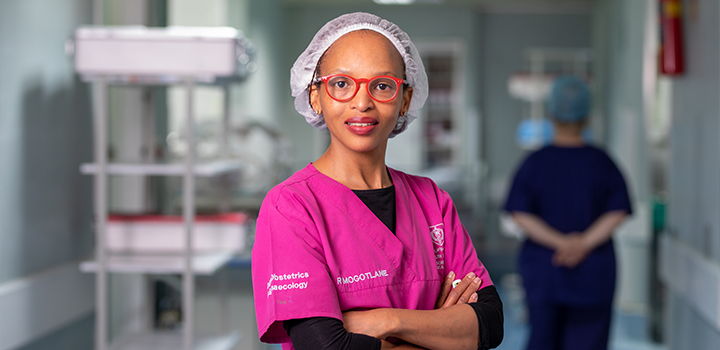"Male infertility is a very real problem" - Dr Ramokone Mogotlane

Gynaecologist Dr Ramokone Mogotlane realised early in her career that infertility is not only a woman's problem. Male infertility can affect a person's entire life. That is why she has chosen reproductive medicine as the focus of her sub-specialisation.
When someone mentions the subject of infertility, people tend to assume that it is a woman's problem.
"That's not the case at all," says Dr Ramokone Mogotlane, a gynaecologist who is sub-specialising in reproductive medicine. "Male infertility is a very real problem and these patients are becoming increasingly aware of their reproductive, endocrine and fertility issues."
There is a shortage of reproductive specialists to address this need in South Africa, and Dr Mogotlane hopes that her research will contribute to addressing this issue within the public health system. She's received a Discovery Foundation Sub-specialist Award to continue her good work.
Three generations in the medical field
Her interest in gynaecology and reproductive health is not surprising, given her family's health background.
"My grandmother was the village midwife at Moletlane Village and at Groothoek Hospital in Zebediela [in Limpopo]. When I was a registrar, I would often discuss with her all the difficult deliveries I had. She always had some advice for me on how to overcome the practical and emotional challenges in obstetrics and gynaecology," Dr Mogotlane says.
But it wasn't just from her grandmother that her interest in medical matters stemmed. Her parents were professors in medicine: her father in anatomy and surgery and her mother in nursing science.
Dr Mogotlane grew up in Umlazi outside Durban, and in Soshanguve, 30 km north of Pretoria. She studied medicine at the Medical University of South Africa, today Sefako Makgatho Health Sciences University, and specialised in obstetrics and gynaecology at the University of Pretoria. Now, she is doing a fellowship in reproductive medicine at the University of the Free State.
Male infertility a neglected field
Why did she choose this field? "Infertility is sometimes a neglected field, as it is not life-threatening. But the emotional and social complications it can bring about can threaten someone's emotional wellbeing in a profound way," Dr Mogotlane says.
"I remember being deeply touched by a young man from a rural area who was only 18 years old. He had lost a leg, and wanted to donate some sperm for possible future use. He was so lost and confused. That particular patient partially inspired me to become further involved in this field of study," she adds.
She explains that testicular cancer often threatens male fertility, and that the preservation of fertility in those patients is highly important. Her research involves both oncology and fertility, as the two are often linked.
A necessary focus on male infertility
Dr Mogotlane says that when couples come to see her, it is essential to investigate both of them, and that male infertility deserves attention as well.
She finds it very encouraging that there seems to be greater awareness of how lifestyle issues can influence fertility in both men and women.
"I do hope that the outcomes of my research will contribute to improved short- and long-term reproductive physical and psychological outcomes in men and their families," she says. "This really is an aspect of health that affects the entire spectrum of life of a person."
She was very happy when she heard that she had received a Sub-specialist Award from the Discovery Foundation. Dr Mogotlane says she would like to make a lasting difference in the field of reproductive medicine. She teaches undergraduate students and registrars, and is also involved in supervising research projects of the latter.
She has clearly taken her parents' wishes to heart - they always stressed how important it is to work in South Africa where she could have the most impact on our people. And that is exactly what she plans to keep on doing.
This article was created for the 2020 Discovery Foundation Awards and has been adapted for the Discovery Magazine.
About the Discovery Foundation
Since 2006, the Discovery Foundation has invested over R256 million in grants to support academic medicine through research, development and training medical specialists in South Africa.
The Discovery Foundation is an independent trust with a clear focus - to strengthen the healthcare system - by making sure that more people have access to specialised healthcare services. Each year, the Discovery Foundation gives five different awards to outstanding individual and institutional awardees in the public healthcare sector.
Related articles

Despite a challenging year marked by the global COVID-19 pandemic, the Discovery Foundation continues to support cutting-edge clinical research and medical training in South Africa's public and academic medicine sector.

Supporting the mental health of young men undergoing ritual circumcision
Traditional initiation rites can sometimes lead to traumatic outcomes for young men. Prof Zukiswa Zingela and her team are finding innovative ways of bringing mental healthcare to communities in far-flung regions of the Eastern Cape.

Empowering women with better access to family planning
At the time of writing in 2020, Dr Dylan Gibson was in his final year of the family medicine postgraduate programme through Walter Sisulu University in Mthatha. He received a Discovery Foundation Rural Individual Award to fund his research on contraceptives.